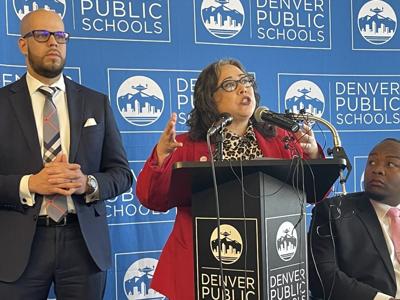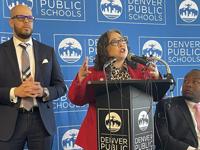After more than five hours in executive session — meaning closed to the public — to discuss security in the wake of the recent shooting at East High School, the Denver Public Schools Board of Education emerged with a memo reversing its policy on no cops in schools.
Did they violate state law?
Steve Zansberg, a First Amendment attorney in Denver and president of the Colorado Freedom of Information Coalition, said yes.
“It is a clear-cut violation of the open meetings law,” Zansberg said.
Zansberg is a prominent media attorney who has represented a number of newspapers and other media outlets in the state, including The Denver Gazette.
Denver Public Schools officials declined to comment.
The Colorado Sunshine Law requires state and local governments to discuss and take action in meetings that are open to the public.
The law does permits a carve-out for specific purposes.
A public body may go into executive session to purchase property, consult with an attorney for legal advice and for confidential matters, such as personnel matters or discussions about an individual student, among other things including security plans.
Any action, though, must be conducted in public.
When the board returned after five hours and 13 minutes in executive session two weeks ago, Board President Xóchitl Gaytán and other directors read aloud portions of the policy change from a memo drafted in executive session.
She also apologized for the long executive session, saying the board had had “lengthy discussions.”
Without any public discussion, the board unanimously approved the memo.
Zansberg called the board’s action “a rubber stamp” vote.
“They clearly adopted a position by agreeing in advance of a full public vote,” Zansberg said. “They’re not allowed to make a decision behind closed doors.”
A spokesperson for the board said in an email to The Denver Gazette that DPS General Counsel Aaron Thompson “was in the meeting for its entirety.”
Thompson was unavailable for comment Thursday and Gaytán did not respond to an email seeking comment.
Because of Thompson’s presence in the executive session, it is unclear whether the meeting was recorded.
On March 30, The Denver Gazette requested under the Colorado Open Records Act, a copy of the recording — which is required unless receiving legal advice from an attorney — and any notes or documents shared or discussed during the executive session.
Stacy Wheeler, the district’s CORA officer, responded April 3 saying the district had the responsive documents, but that the records were not subject to disclosure.
State law does not prohibit a governing body, such as DPS, from releasing the recording.
Given the intense public interest, Zansberg urged the board Wednesday to exercise its discretion, release the information and save taxpayers the expense of litigation.
If a state public body — in this case the board of education — violates the provisions of Colorado’s Open Meeting Law, the “resolution, rule, regulation, ordinance, or a formal action of a state public body is invalid,” according to the Office of Legislative Legal Services.
State law also provides for costs and attorney fees for any prevailing citizen.






 Your Privacy Choices
Your Privacy Choices